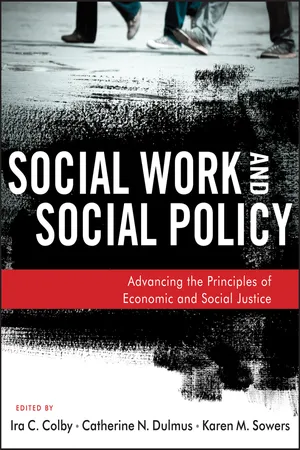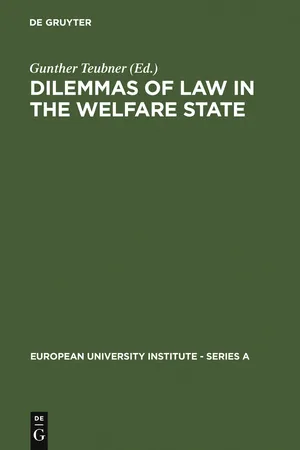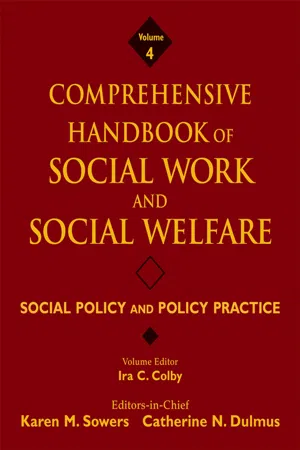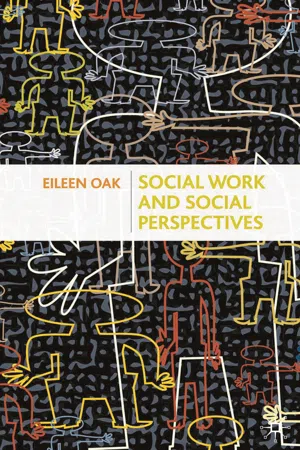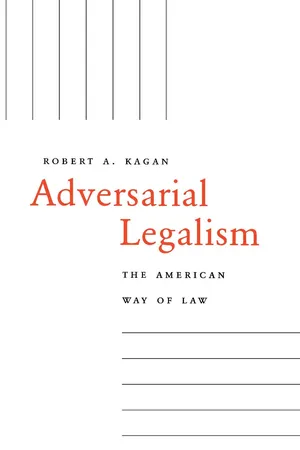Law
Social Welfare Law
Social welfare law refers to the legal framework governing the provision of social services and benefits to individuals and families in need. It encompasses laws related to public assistance, healthcare, housing, and other social support programs aimed at promoting the well-being of society's most vulnerable members. This area of law often involves complex regulations and policies designed to address social and economic inequalities.
Written by Perlego with AI-assistance
Related key terms
1 of 5
7 Key excerpts on "Social Welfare Law"
- eBook - PDF
Juridification of Social Spheres
A Comparative Analysis in the Areas ob Labor, Corporate, Antitrust and Social Welfare Law
- Gunther Teubner(Author)
- 2012(Publication Date)
- De Gruyter(Publisher)
2.2 Social Welfare Law The second area of definitional difficulty relates to the scope of the substantive area of social welfare which is to be the primary focus for discussion in this paper.' When asked to participate in the work on which this volume is based, I was originally asked to write on social security. The particular difficulty with this is that, in the British context, social security has a rather closely defined meaning; it relates only to cash payments paid by the state to individuals in particular, defined circumstances: e.g., unemployment, sick-ness/disability, retirement, birth, death, industrial injury, war injury (for details see, e.g. Ogus and Barendt (1982)). This rather precise concept — focusing exclusively on the techniques developed for providing income to particular groups at risk — is too narrow for a series of papers which, at base, seeks to analyze rather wider issues relating to the relationship between law and economic policy. On the other hand, too broad a concept of social welfare or Social Welfare Law, referring to all those areas of law which relate to the implemen-tation of social welfare or social policy, may be too extensive to be helpful. For example, it could be argued that all public policy was designed to promote 1 Much of the argument that follows in this section is developed from a similar discussion by Partington (1985), an as yet unpublished paper prepared by the author forthe (British) Economic and Social Research Council. See also Cranston (1985). 422 Martin Partington social welfare. 2 (Indeed some would argue that any form of human endeavor — whether promoted by the state or otherwise — could, or even should, advance the sum of human happiness and thus, in that sense, promote social welfare). Although it is important to remember the existence of such debates, completely open-ended uses of the concept of social welfare are likely to prove too wide for the purposes of this paper. - eBook - ePub
Social Work and Social Policy
Advancing the Principles of Economic and Social Justice
- Ira C. Colby, Catherine N. Dulmus, Karen M. Sowers(Authors)
- 2012(Publication Date)
- Wiley(Publisher)
- Collective interventions to meet certain needs of the individual and/or to serve the wider interests of society (Titmuss, 1959, p. 42)
- A system of social services and institutions, designed to aid individuals and groups to attain satisfying standards of life and health, and personal social relationships that permit them to develop their full capacities and promote their well-being in harmony with the needs of their families and community (Friedlander, 1955, p. 140)
- A nation's system of programs, benefits, and services that help people meet those social, economic, educational, and health needs that are fundamental to the maintenance of society (Barker, 1995, p. 221)
These definitions reflect a specific philosophy or view of welfare. Close examination reveals three common themes:- Social welfare includes a variety of programs and services that result in specific, targeted client benefit.
- Social welfare, as a system of programs and services, is designed to address the needs of people. The needs are wide-ranging; on the one hand, they may be all-encompassing, including economic and social well-being, health, education, and overall quality of life; conversely, needs may be narrowly targeted, focused on one issue.
- The primary outcome of social welfare policy is to improve the well-being of individuals, groups, and communities. Helping those people address their specific needs benefits society at large.
The Relationship Between Justice Theory and Social Welfare Policy
All welfare policies are extensions of justice theories and reflect particular principles on the human condition. David Miller (p. 1, 2005) poses the central question related to justice and welfare: - eBook - PDF
- Gunther Teubner(Author)
- 2011(Publication Date)
- De Gruyter(Publisher)
A Concept of Social Law* FRANCOIS E W A L D Paris What is the crisis of the Welfare State? 1 The fact that, because of the economic crisis, the growth in social security expenditure has been accelerating while revenue has been declining? Not just that; but more deeply, the awareness that we members of the developed societies are now living within a new type of State. The very name given to it — Welfare State — suffices to show that as yet it has scarcely been considered in its positive aspects 2 . It denotes a State that, while no longer analysable in terms of the liberal model, is not seen as being in transition to a future socialist State either. This hypothesis suggests a thorough reconsideration of the perspective from which both the institutions and the practices that characterise this new positive entity should be looked at. They ought no longer to be analysed as a mere set of measures aimed at correcting the harshness and injustices of a liberal State, but as the coordinates of a new type of political space with an internal logic of its own. This is the case for social law , which is the term for the legal practices that typify the Welfare State. It ought not to be analysed as a series of particular provisions in the two areas of labour and social security, but as the formation of a new legal system from the viewpoint of sources as well as logic and modes of application. What makes social law is much more than the legalisation of objects or situations too long excluded from law. It is rather a process of transformation, able to move through the whole set of legal disciplines, from civil law to international law via administrative law; and this is a process of socialisation. This process amounts to the transformation of the political and governmental rationality linked up with the sociological conception of society that characterises the Welfare State. What changes the old legal system into the new one is the way of * Translated from the French by Iain Fraser. - eBook - PDF
- (Author)
- 2008(Publication Date)
- Wiley(Publisher)
(Chatterjee, 1966, p. 3) 116 Social Welfare Policy as a Form of Social Justice [A] pattern of relationships which develop in society to carry out mutual support function. (Gilbert & Specht, 1974, p. 5) Human concern for the well-being of individuals, families, groups, organizations, and communities. (Morales & Sheafor, 1989, p. 100) Collective interventions to meet certain needs of the individual and/or to serve the wider interests of society. (Titmus, 1959, p. 42) A system of social services and institutions, designed to aid individuals and groups to attain satisfying standards of life and health, and personal social relationships which permit them to develop their full capacities and promote their well-being in harmony with the needs of their families and community. (Friedlander, 1955, p. 140) A subset of social policy, which may be defined as the formal and consistent ordering of affairs. (Karger & Stoesz, 2004, p. 4) A nation’s system of programs, benefits, and services that help people meet those social, economic, educational, and health needs that are fundamental to the maintenance of society. (Barker, 1995, p. 221) These definitions reflect a specific philosophy or view of welfare. Close examination reveals three common themes: 1. Social welfare includes a variety of programs and services that result in some type of client-specific benefit. 2. Social welfare, defined as a system of programs and services, is designed to meet the needs of people. The needs to be addressed can be all-encompassing, including economic and social well-being, health, education, and overall quality of life, or they may be very restricted, targeting just one issue. 3. The outcome of social welfare policy is to improve the well-being of individuals, groups, and communities. Helping those client systems in time of need will later benefit society at large. - eBook - ePub
The Left and Rights
A Conceptual Analysis of the Idea of Socialist Rights
- Tom Campbell(Author)
- 2013(Publication Date)
- Routledge(Publisher)
2 )Further, the sphere of social administration appears to illustrate a number of the points which I have made about socialist rights. Welfare rights function primarily as directives to administrators and only secondarily as legal instruments in the hands of aggrieved persons. They are rights whose implementation depends less on their being activated by the right-bearer than it does on organisation. Welfare rights serve as the basis for positive action by government to discover and meet the needs of those requiring assistance. They are rights which relate to the interests and concerns of individuals which cannot easily be regarded as self-centred or predatious on the interests of others; often, as in the case of family support services, welfare rights recognise the claims of fundamentally altruistic concerns. Although welfare rights can lead to court orders being made against officials who have failed in or misinterpreted their duties, they do not characteristically operate as instruments of ‘coercion’ against those with the correlative obligations. They are rights which are necessary for the purposes of the effective social co-ordination of action designed to relieve poverty and deprivation even when good will and genuine concern characterise the attitudes of the majority of the relatively well-off members of society.Moreover, the significance of speaking in terms of the ‘rights’ of those in need is clear. (3 ) It draws attention to the existence of, or the desirability of creating, rules directing the actions of those with command over economic and human resources towards the relief of poverty. It marks the priority which is normally attached in a modern society to meeting basic course-of-life needs which in becoming a matter of right are thus given an ‘exclusionary’ protection in that the relief of need is removed from the haphazard exigencies of available resources, official discretion or private initiative. Further, institutionalising the relief of need, thus making it a matter of entitlement, gives the poor a dignity lacking in the receipt of charity through acts of supererogation which, because they go beyond the call of strict duty, endow the giver with special virtue. Charity goes along with the expectation of gratitude and admiration for the giver and the stigmatising status of being a beggar, concepts which have no place in relationships based on correlative rights and duties. Also, the notion of welfare rights encapsulates the sense that welfare is an individualising concept in that its objective is to perceive and meet the needs of specific individuals rather than achieve some general social objective which is only indirectly for the good of individuals. Finally, welfare rights, being based on the degree of need rather than the instrumental value of benefiting certain classes of persons, can be a forceful protection of the most deprived sections of a population against the forces of selfish majoritarianism. Where constitutional protection or strong political commitments are linked to the notion of a right to welfare this brings with it some sort of protection for the poor against the political expression of utilitarianism through the ballot box, a democratic process which inevitably tends to benefit the broad mass of the population, or those who can manipulate that mass, to the disadvantage of deprived minorities. (4 - eBook - PDF
- Eileen Oak, Jo Campling(Authors)
- 2008(Publication Date)
- Bloomsbury Academic(Publisher)
68 Contexts of Social Work Case Study ( cont’d ) Byrne, D. (2002) Social Exclusion (Buckingham: Open University Press). This book provides another dimension of social exclusion by exploring the impact of spatial exclusion. Williams, F. (2003) ‘Social Policy: Culture and Nationhood’, in P. Alcock, E. Erskine and M. May (eds), The Student’s Companion to Social Policy (Oxford: Blackwell Publishing). Williams demonstrates the interconnections between ethnicity, gender and racism, this time by examining the issue of immigration. Poverty, Social Exclusion and Citizenship 69 4 Sociology, the Law and Social Work Practice Introduction For all social workers the law provides the framework within which services are offered: it is impossible to practice without coming up against the law and it is impossible to practice effectively without an in depth understanding of how the law affects everyday social work practice. (Johns, 2003, p. 167) As Johns (2003) points out, there is a distinct difference between the need of social workers to understand the law and integrate it into their practice, and that of members of the legal profession. For a start, social workers are not involved in the same way lawyers are (for example, they are not engaged to defend or prosecute anyone). For social workers, understanding the law underpins their work in the promotion of human rights. It under-pins the intervention in people’s lives to protect them from themselves or other people. It relates to the protection of people’s rights in terms of access to information, confidentiality, assisting with entitlements to services. It also informs the provision of advocacy services and working in publicly accountable organizations (Johns, 2003). All these tasks require reference to the law. Key Words civil law, criminal law, legal reasoning, precedent, legal realists, natural law theory, human rights, international law 70 - eBook - PDF
Adversarial Legalism
The American Way of Law
- Robert A. Kagan, Robert A. KAGAN(Authors)
- 2009(Publication Date)
- Harvard University Press(Publisher)
One consequence is that litigation, courts, and adversarial legalism play a much more significant role in shaping and administering social and educational policy in the United States than in other countries. This chapter describes the distinctive prominence of adversarial legalism in the American welfare state, explains that prominence, and examines some of its consequences. The American Welfare State in Comparative Perspective The “welfare state” is one of the most striking public policy developments of the twentieth century, representing both a political and a humanitarian strat-egy for softening the harsh edges of capitalism. In country after country, gov-159 ernments have imposed taxes and created programs to buffer families from the devastating effects of illness, sudden economic loss, and poverty. Ger-many’s 1920 Weimar constitution declared a right to social insurance. Chile’s 1925 constitution “guarantees to all the inhabitants of the country . . . social security, especially regarding healthy housing and economic conditions of life such that each inhabitant . . . would have a minimum of welfare for his needs and that of his family.” 1 Neither Weimar Germany nor Chile truly fulfilled their constitutional promises, of course, but the aspirations expressed in such documents have been of great political and practical importance. By the last third of the cen-tury, most economically advanced democracies had guaranteed their citizens free public education and medical care. They had enacted laws assuring fami-lies a meaningful level of income replacement in the event of a breadwinner’s unemployment, injury, disability, or retirement, and even in the event of mar-ital separation or divorce. Many nations provide or subsidize day care for pre-school children of working mothers, mandate paid vacations and maternity leaves for workers, provide job training for the unemployed, and construct low-cost housing for poor families.
Index pages curate the most relevant extracts from our library of academic textbooks. They’ve been created using an in-house natural language model (NLM), each adding context and meaning to key research topics.

